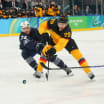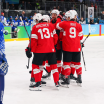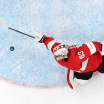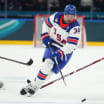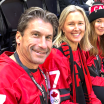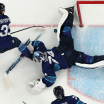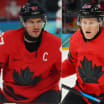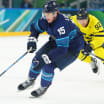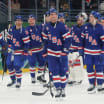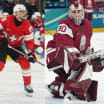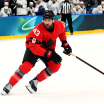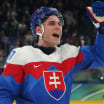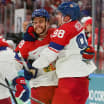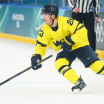Legendary hockey reporter and analyst Stan Fischler will write a weekly scrapbook for NHL.com this season. Fischler, known as "The Hockey Maven," will share his knowledge, humor and insight with readers each Wednesday.
Today, he takes a look back at one of the most famous overtime games in the history of the Stanley Cup Playoffs, the four-OT win by the New York Islanders against the Washington Capitals in Game 7 of the 1987 Patrick Division Semifinals.
LaFontaine was hero for Islanders in 'Easter Epic'
Scored in fourth overtime to give New York marathon Game 7 win during first round of 1987 playoffs
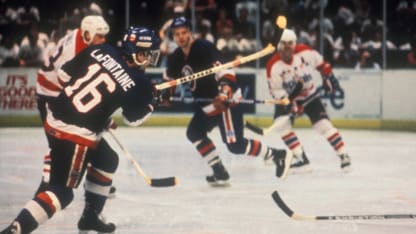
© B Bennett/Getty Images
By
Stan Fischler
Special to NHL.com
They call it "The Easter Epic," although the game actually started the night before.
They call it "
Pat LaFontaine
's Finest Hour," although it took hours before his big moment arrived.
They can call it what they want, but this much is certain: The longest game in New York Islanders history took six hours and 16 minutes to play before ending at 8:47 of the fourth overtime.
I should also point out, not that it mattered to anyone else but me, that I almost killed myself in the process. We'll get to that later.
More important, this was
Game 7 of the Patrick Division Semifinals
, a series that the Washington Capitals looked like they had in the bag after taking a 3-1 lead. But the Islanders won Games 5 and 6 to set the stage for Game 7 on April 18, 1987.
Fischler on LaFontaine's famous OT goal vs. Capitals
A capacity crowd at Capital Centre in suburban Landover, Maryland, cheered on the Capitals as they nursed a 2-1 lead late in the third period. But Islanders center
Bryan Trottier
, always a clutch performer, beat goaltender
Bob Mason
at 14:37 to make it 2-2.
Nobody knew it at the time, but a marathon among marathons was about to unfold.
Then again, perhaps somebody did know something, because the series had attracted a lot more media than anyone had expected. The media attention surprised players on both sides.
"When we got up in the morning, we couldn't believe how many reporters were there," LaFontaine remembered. "Both English and French-Canadian TV, ESPN, and the television crews from the two teams. I knew the spotlight was on."
Spurred by their fans, the Capitals swarmed the Islanders in the early going, outshooting them 15-5 in the first period and 10-5 in the second. They led 2-1 entering the third period.
"Everyone in the audience was wearing white," Islanders goalie
Kelly Hrudey
said. "Management had asked the fans to dress in white. I guess that was meant to lighten the mood after we had rebounded from a 3-1 deficit to tie the series."
The light mood faded after Trottier took
Alan Kerr
's pass, went around Washington defenseman
Kevin Hatcher
and took a backhander that found an opening in Mason's pads with 5:23 remaining in the third period.
"Trots' goal was huge," Kerr said. "The Caps were really taking it to us physically. But after we tied the game, it didn't matter how much they outshot us or outchanced us. We felt we had them right where we wanted them."
Said LaFontaine: "Knowing that the Islanders had such a tremendously successful overtime record, we believed we were destined to win the game."
But that was more easily said than done.
In the evenly played first overtime, Islanders center
Bob Bassen
raced in on a breakaway but shot the puck into Mason's stomach. Near the end of the period, Washington defenseman
Greg Smith
beat Hrudey but rang his shot off the post.
"By the time the second overtime began," Bassen said, "it became a case of survival of the fittest."
I can vouch for that. Doing my analysis for the Islanders telecast on SportsChannel, I worked from a small studio diagonally across from the visitors dressing room. It was too far away to see the ice, so my stage manager, John McComb, had arranged to have a small TV monitor placed in front of my chair so I could watch our telecast and take notes.
Always emotional, and in this case rooting for the Islanders, my body reacted to all the major moves. When Capitals sniper
Mike Gartner
appeared about to beat Hrudey, I nervously leaned so far back in my chair that I wound up going headfirst toward the concrete floor.
McComb, who had become accustomed to my histrionics, dove forward and cushioned my head a split-second before it hit the floor, which very likely would have sent me to Concussionville.
Meanwhile, Hrudey was making like Mandrake the Magician, surviving a scoring bid by Capitals forward
Bobby Gould
(who was scoreless despite taking 12 shots on goal) that looked as if it would end the game. Mason got a break when Randy Wood's shot went under his pads but hit the post.
Despite that, "We all felt we were going to win the game," Wood said. "It was just a matter of time."
But the second overtime ended without a winner, and now it was a war of attrition along with survival of the fittest.
"Each guy had his own way of relaxing during the intermissions," Islanders forward
Patrick Flatley
said. "A lot of guys just lay on their backs on the dressing room floor with their feet up on the locker stalls."
This was the era when the NHL used only one referee (along with two linesmen). Veteran Andy Van Hellemond, a future Hockey Hall of Famer, read the situation perfectly.
"Andy knew how tired the guys had been by the time the third overtime began," Washington defenseman
Scott Stevens
said. "That explains why he didn't call any penalties from the third overtime] period to the finish."
Meanwhile, the goaltenders were having their own duel. Hrudey finished with 73 saves; Mason made 54.
"At times we were very sloppy in our own end, but Kelly kept on bailing us out," said Islanders defenseman
[Steve Konroyd
, one of many who felt Hrudey stole the game for New York. "Kelly and Mason were so good. By the end of the second overtime the puck must have looked like a basketball to them."
Ironically, Hrudey's backup that night was
Billy Smith
, who had helped carry the Islanders to four consecutive Stanley Cup championships from 1980-83 and is still regarded as one of the best clutch goalies in NHL history.
"Kelly put on a show that made Smitty proud," Kerr said.
The scoreboard still read 2-2 after the third overtime. Hrudey was amazed by the way the teams continued to fly around the ice even as Saturday night turned into Sunday morning.
"I was astonished at the pace of the game and how hard the guys were working, even through the third overtime," he said. "It would seem a guy was exhausted and could barely lumber back to the bench. But when his next shift was on, he would pounce over the boards and give it all he had again."
After the teams galumphed off the ice following the third overtime, LaFontaine repeated what he had shouted to his teammates during earlier intermissions: "Who's gonna be the hero?"
Little did he know.
By the eight-minute mark of the fourth overtime, some spectators appeared to be totally stressed out while others were sleeping. The clock had almost ticked its way to 2 a.m. on Easter Sunday.
Islanders trainer Jim Pickard took a water bottle and doused LaFontaine to cool him down before his next shift. The arena organist then broke into a rendition of the theme from "The Twilight Zone."
As LaFontaine was about to clamber over the boards for his shift, Picard shouted, "You're gonna score the winner."
A curious play was developing as LaFontaine's skates touched the ice: Defenseman
Gord Dineen
took a huge gamble by pinching in from the blue line and carrying the puck behind Washington's net.
LaFontaine wisely covered for Dineen while forward
Dale Henry
set up shop outside the crease, screening Mason. Dineen's shot attempt hit the stick of Stevens and caromed to LaFontaine at the right point. With the puck on edge, he took a turnaround slap shot.
"I turned around and gave it my best shot," LaFontaine said. "I didn't think it had a chance because (Capitals defenseman)
Rod Langway
dove to block it, and I think I saw it deflect off Hatcher.
"Then I heard a 'clank' and looked to see where the rebound went. I didn't know it was all over until everyone started mobbing me."
Hrudey watched in disbelief.
"I thought, 'No, this game can't end. We've been playing this long; there must be a penalty or a man in the crease.' Then I realized it was over and I jumped without any energy.
"Then (defenseman)
Randy Boyd
came, hugged me and knocked me over."
As for me, jubilant in the studio, I got as lucky as LaFontaine.
When the winners finally trooped off the ice, they had to pass my TV location. As LaFontaine trundled by, I grabbed him for an on-camera chat before any public relations person could stop me.
To this day, I regard the post-marathon interview with LaFontaine as one of the highlights of my career. As a matter of fact, I shared Hrudey's personal observation on those moments that became forever known as the "Easter Epic."
"It was the best game I ever played," he concluded, "and the greatest game I've ever been a part of."
I second the motion.
